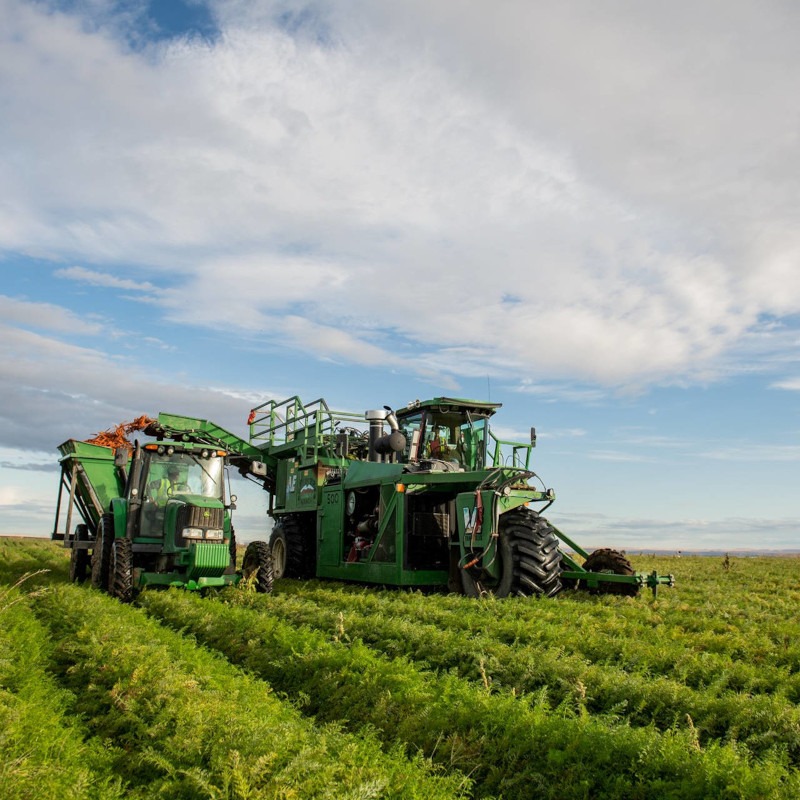
Threemile Canyon Farms
Sustainability Practices:
- Recycles and reuses all non-potable water
- “Green water” is applied to fields to naturally fertilize organic and feed crops
- Uses high-tech central-pivot irrigation systems minimize water lost
Links
About our Farm
Cycling the Sustainable Benefits of Potato Production with a ‘Closed-Loop’ System
Farms have long emphasized the 4Rs of nutrient management – right source, right rate, right time, and right place – as keys to doing more with less.
But there is another 4R model – reduce, reuse, recycle and recover – that drives sustainable potato production at Threemile Canyon Farms (TCF) in Boardman, Ore. For the last 20 years, the diverse dairy and row crop operation has developed and implemented methods to capitalize on renewable farm resources that reduce waste and maximize efficiency.
The operation grows about 300,000 tons of more than ten different varieties of potatoes, typically planted in mid-March with a 6-row Lockwood Air Cup planter. While potatoes are processed off-site, any waste or “peels and culls” are returned to the farm and recycled as dairy feed.
The repurposing of potato waste is a cornerstone of the operation’s ‘closed-loop’ system, which reinvests residual nutrients created by the dairy and row crop production back into those operations. The system has been the catalyst for the expansion of sustainable processes on the farm, including the conversion of wastewater into “green water” and ongoing investment in advanced irrigation technology to conserve moisture.
“The closed-loop system all starts with the cow,” says Greg Harris, director of farming and agronomy at TCF. “Our cows produce two primary products; milk for cheese and manure that is the fuel for the farm’s methane digester. The digester converts methane into renewable natural gas (RNG), which is then injected into a natural gas pipeline and used as a transportation fuel.”
In addition, the digester generates enough energy to support about one-third of the farm’s annual power needs and sequesters more than 135,000 metric tons of CO2 per year – equivalent to the amount of carbon sequestered from more than 160,000 acres of forest land.
The residuals from the digester are also used as bedding for cows, soil amendments, and liquid fertilizer for organic and conventional row crops explains Harris. “Crops from TCF’s farming operations are also used for feed, thus closing the loop that starts and ends with our cows,” he says.
‘Green’ and Growing
Necessary tillage and heavy nutrient uptake of potatoes can take an annual toll on soils, which is why many growers typically rotate potatoes every third year with a less demanding crop that allows soils to recover.
While a spring tillage pass to prepare the soil ahead of potato planting is often required, TCF has been able to extend their rotation window to every fourth year, improving crop quality and reducing disease risk and reliance on crop protectants.
One of the more unique aspects of the farm’s closed-loop system is its processing of “green water.” The water used to flush dairy waste is collected in lined settling lagoons on the farm, then filtered and injected into the irrigation system and applied to potato fields at agronomic rates on a circle-by-circle basis as organic liquid fertilizer.
“A part of our closed-loop system is using green water from the dairy and repurposing it as crop nutrients,” Harris says. “This nutrient-rich green water provides a good source of nitrogen, phosphorus, and potassium, all of which are essential to our row-crop operation.”
The process has reduced TCF’s overall reliance on crop protection products and allowed the operation to increase its certified organic acreage from about 270 acres in 2002 to nearly 15,000 today – making it one of the region’s largest organic and feed crop producers.
Pivoting into Precision
TCF’s long-term investment in conservation tillage practices and cover crops has minimized soil erosion and weed pressure and improved soil health on potato acres.
But it has also invested in advanced moisture management technology to make the most of every water application across nearly 40,000 acres under more than 400 center pivot irrigation systems.
“Some fields have varying terrains and soil types that need different amounts of water to produce a healthy crop,” Harris says. “We use a variety of innovative irrigation techniques to ensure our potato fields receive the precise amount of water needed – and not a drop more.”
Data collected through widespread soil sampling with neutron probes and real-time, GPS-based electroconductivity moisture sensors help irrigation managers customize water and fertilizer applications by crop circle.
Analysis of historical and current weather information further guides potato irrigation decisions, with precise application control down to the individual sprinkler heads. Recent upgrades, including pumping automation controls, have also helped save close to 666,000-kilowatt-hours each year through more timely activation of pumps.
Harris adds that every pivot circle has its own radio frequency identification (RFID) tag to match the correct amount and application rate of “green water” to the intended crops. And TCF’s irrigation pipes are equipped with flow meters to document application rates on a second-to-second basis in accordance with strict standards set for Columbia River water use.
“When TCF was formed, sustainability was front and center, where nothing is wasted,” Harris says. “Our zero-waste, values-driven operations reflect our commitment to protecting the environment, caring for our animals, and supporting our community.”
A part of our closed-loop system is using green water from the dairy and repurposing it as crop nutrients. This nutrient-rich green water provides a good source of nitrogen, phosphorus, and potassium, all of which are essential to our row-crop operation.
– Greg Harris, Threemile Canyon Farms
Photo Gallery
Who is putting potato sustainability into practice?